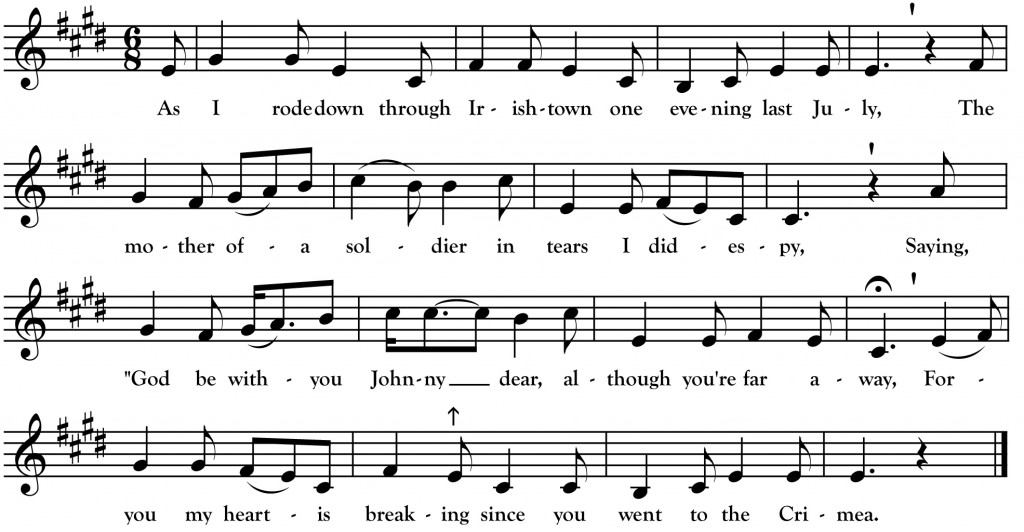As I Rode Down Through Irishtown [The Crimean War] (Laws J9)
As I rode down through Irishtown one evening last July,
The mother of a soldier in tears I did espy,
Saying, “God be with you, Johnnie dear, although you are far away,
For you my heart is breaking since you went to the Crimea.
“Oh, Johnnie, I gave you schooling, I gave you a trade likewise.
You need not have joined the army if you had taken my advise,
You need not go to face the foe where cannons loud do roar,
Think of the thousands that have fallen now upon that Russian shore.
He joined the Fourteenth regiment, it was a splendid corp,
They landed honorable mention upon the Russian shore;
He fought in foreign engagements with the loss of men each day,
And there is many a mother shedding tears for sons that are far away,
“You fought at Kurksharosko where you did not succeed,
Likewise at the valley of Inkerman, where thousands there did bleed,
You fought at Balaklava, too it was there you gained the day,
And my darling is a hero although he’s far away.
“It was when we attacked Sebastapool, it was there you’d see some play,
The very ground we stood upon it shook, the truth I say,
The clouds were black with heavy smoke from bomb shells firing there,
And thousands weltering in their blood that went to fight the Bear.
“The English said they would gain the seas whate’er might be their doom,
And thousands there a-falling, cut down in their youthful bloom,
There Paddy’s sons with English guns their valor did display,
And together with the sons of France, thank God, we gained the day.
“Had your heart been made of iron for them you would shed tears,
To see those heroes falling, cut down in their youthful years,
To see those heroes falling and weltering in their gore,
Far from their home and friends, my boys, upon that Russian shore.
“So now to end and finish and to conclude my song,
I thank the God above me for having survived so long,
Likewise my poor old mother, ’twas her I did adore,
And I hope, dear mother, to meet you safe in Garryowne once more.
__________________________________________________________
Every town is an “Irishtown” on St. Patrick’s Day but there are also a few places scattered around the world actually named “Irishtown” including a small town in the Adirondack Mountains of upstate New York. The above version of this song lamenting the sad fate of Irish soldiers in the Crimean War (1853-1856) was sung by Minnesotan Mike Dean (1857-1931) who was born just north of the Adirondacks. “Irishtown” could refer to the Adirondack town, or it could be a simple reference to an Irish neighborhood somewhere else. Versions collected in Ontario and Michigan say “Irish town.”
Dean’s melody is a nicely turned version of the usual one for this song in tradition and it is a well-travelled air associated with many traditional songs including the Scottish “Tramps and Hawkers.” It was also used by song-maker and lumberjack Billy Allen (1843-1929) of Wausau, Wisconsin for his song “Driving Saw Logs on the Plover.” Bob Dylan (born in Duluth just ten years after Dean’s death up the road in Virginia, MN) also seems to have been inspired by this melody in the air he used for his song “I Pity the Poor Immigrant.”
References:
“Bodleian Library Broadside Ballads.” Accessed February 20, 2013. http://www.bodley.ox.ac.uk/ballads/
________________________________________________________
More detailed information on this song from the Traditional Ballad Index.


